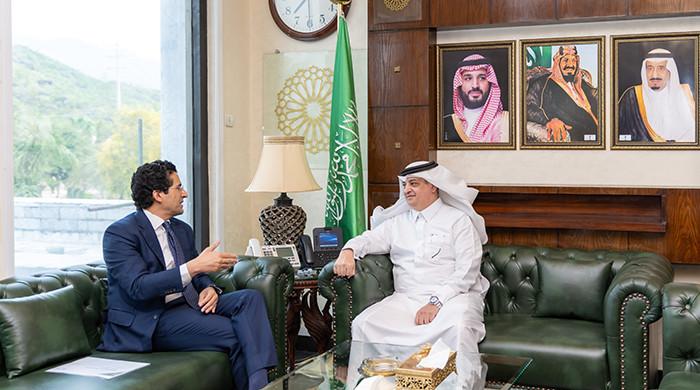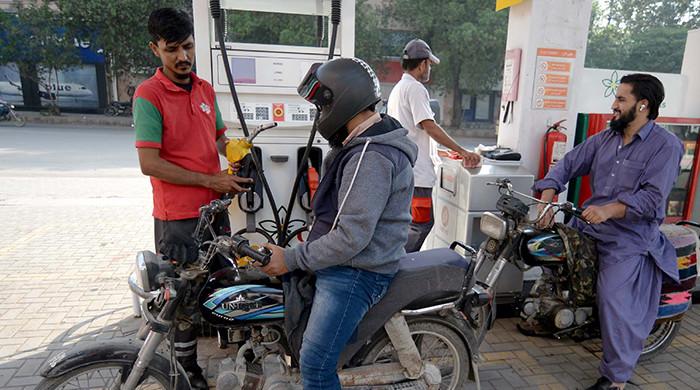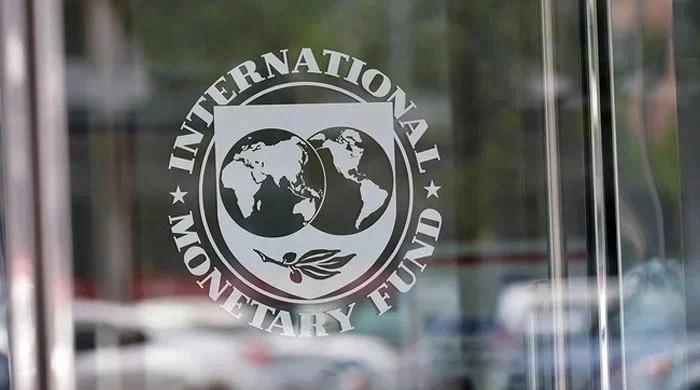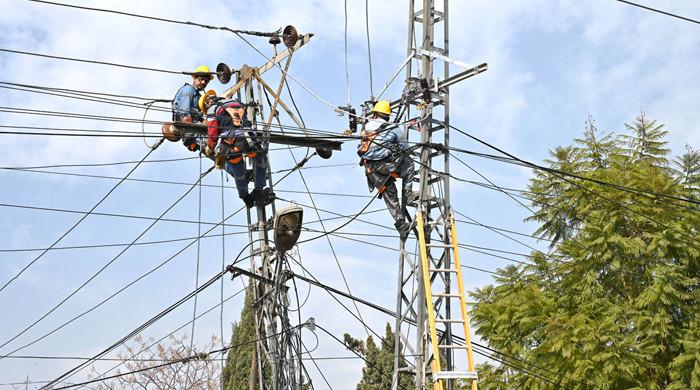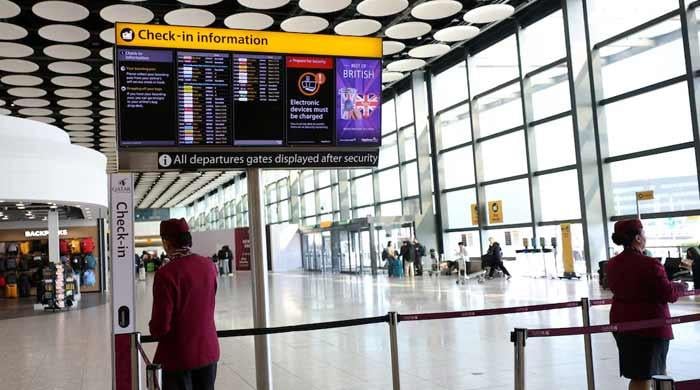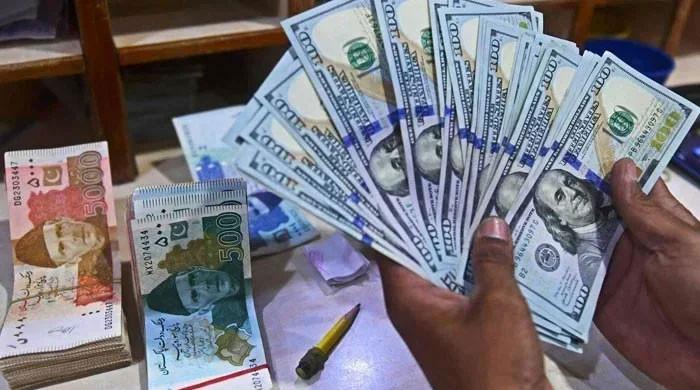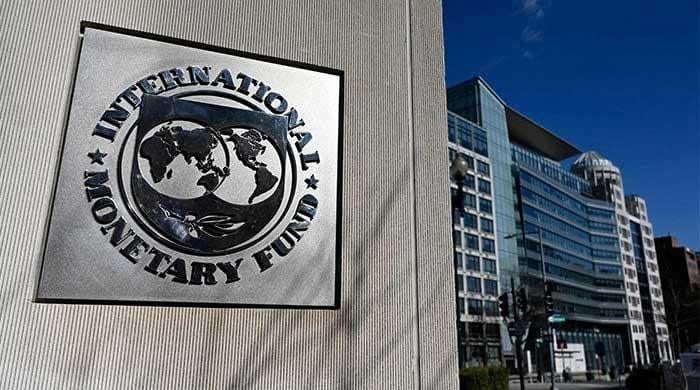Tax policy role shifted from FBR to Finance Division: Aurangzeb
Finance minister says next budget to be presented in 2026 will be led by Finance and Tax Policy Office
August 19, 2025
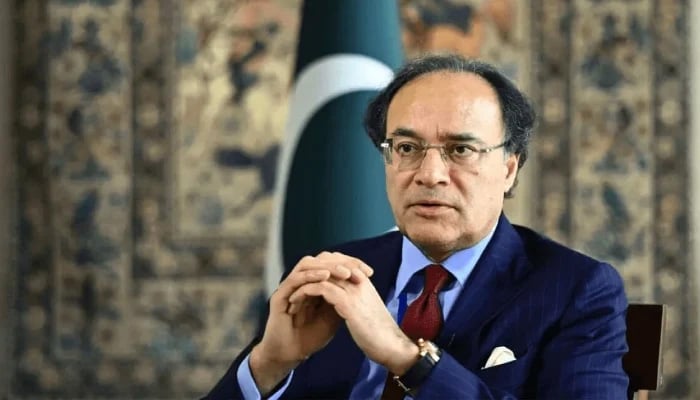
- Govt working on industrial policy to accelerate industrialisation.
- Minister announces tariff reforms to support industries.
- Cashless initiative digitising salaries, pensions, payments launched.
KARACHI/ISLAMABAD: Finance Minister Muhammad Aurangzeb said on Monday that the task of formulating the upcoming federal budget has been reassigned to the Finance Division, working with the Tax Policy Office (TPO), effectively taking the responsibility away from the Federal Board of Revenue (FBR), The News reported.
“The Tax Policy Office is now moving to the Finance Division. The FBR has nothing to do with the policy [matters],” said Aurangzeb at a conference titled ‘Unlocking Capital Market Potential for Banks’.
“The next year’s budget to be presented in 2026 will be led by the Finance and Tax Policy Office, and not by the FBR,” he added.
In February, the government announced the establishment of the TPO, which will be led by the finance minister and located in the finance ministry building as part of the government’s economic reform agenda. According to the notification, the TPO will develop tax policies and proposals using data modelling, as well as revenue and economic forecasting.
The finance minister stated that the government aims to create an enabling environment and provide a supportive ecosystem, which includes ensuring policy continuity. Over the past two to three months, the government has introduced several policies: the tariff policy, the National Electric Vehicle Policy, the digital policy, and the cashless economy initiative.
The government is actively working on an industrial policy that will be announced soon, aimed at creating a supportive environment and accelerating industrialisation in the country, according to the minister.
“Haroon Akhtar [Special Assistant to Prime Minister for Industries & Production] is working day and night to get that (industrial policy) through the cabinet and make an announcement. This is an important element of how we are going to move from stability to sustainable growth, because these underlying pillars are going to be quite critical,” Aurangzeb said.
Regarding tariff reforms for industries, particularly export-oriented businesses, the minister indicated that the government needs to reduce customs duties, additional customs duties, and regulatory duties over the next four to five years.
“I just want to be very clear that the IMF has nothing to do with it. Tariff reforms is very much a home-grown agenda of the government and this administration to make our industry more competitive as we go forward,” he said.
He also proposed formation of a Capital Market Development Council to mobilise funds for development through domestic capital markets, such as the Pakistan Stock Exchange (PSX). Key stakeholders in this council could include the Securities and Exchange Commission of Pakistan (SECP), the State Bank of Pakistan, the Pakistan Bankers Association (PBA), insurance companies, and other institutions, along with provincial representatives, since much of the execution power now lies with the provinces.
Additionally, the minister noted that the PSX has recently surpassed the historic 140,000-point mark for the first time. This milestone reflects strong market confidence and consistent returns, which will further enhance Pakistan’s financial sector.
On the same day, the finance minister announced that Pakistan is on the verge of entering a growth phase, having achieved macroeconomic stability over the past two years. He said that this growth momentum would be sustained.
He made these remarks during the inauguration of the PHC Job Fair and Education Expo 3.0 at the Expo Centre. Pakistan achieved an economic growth rate of 2.7 per cent in FY25, up from 2.5 per cent in FY24 and a decline of 0.21 per cent in FY23. The government has set a growth target of 4.2 per cent for the fiscal year 2025-26.
In response to media inquiries, Aurangzeb noted that three global credit rating agencies — Fitch, S&P, and Moody’s — have upgraded Pakistan’s credit rating. He remarked that this alignment among the agencies is a strong vote of confidence, indicating that the country is moving in the right direction.
“We have to move forward towards sustainable and exclusive growth because the gold rush is not a good idea. We had faced the boom-and-bust cycle a number of times. The more we put feet on the paddle and tried to accelerate the economy (rapidly), we were in trouble,” he said.
Aurangzeb said the State Bank of Pakistan (SBP) is working on the exchange rate and interest rate, and the situation is expected to improve further. He added that the corporate sector should step forward, and interest rate should not be made the single-point agenda. In order to promote working capital, Pakistan must look beyond banks and include capital markets as well.
Aurangzeb pointed to Pakistan’s strong anti-money laundering laws, which he said had enabled the country’s removal from the FATF grey list. He expressed confidence that Pakistan would remain off the list going forward.
Separately, global credit rating agency Fitch Ratings has projected Pakistan’s real GDP growth to rise from 2.5 per cent in 2024 to 3.5 per cent by 2027. “Pakistan’s improved sovereign credit profile reinforces this view,” Fitch noted, referring to the upgrade of the country’s Long-Term Issuer Default Rating (IDR) to ‘B-’/Stable from ‘CCC+’ in April 2025. The rating improvement was underpinned by ongoing economic recovery, reforms and improving fiscal performance.
The recovery comes after a particularly turbulent period for Pakistan’s economy. Inflation, which peaked at 38pc in May 2023, has since eased to 4.1pc in July 2025, with Fitch expecting it to average around 5pc for the year.
Meanwhile, monetary policy has shifted in response to easing inflationary pressures. Since May 2024, Pakistan’s central bank has halved the policy rate to 11pc, while external stability has improved through reduced currency volatility and current account surpluses.
Fitch anticipates that this combination of lower interest rates and a more stable macroeconomic environment will boost demand for private credit. “We expect the combination of lower interest rates and an improving macroeconomic environment to stimulate private credit demand,” Fitch said, adding that this should support “steadier loan and deposit growth, and banks’ financial performance.”
The agency noted that Pakistan’s banks are set to benefit from better opportunities to generate business volumes due to improving operating conditions amid receding macroeconomic headwinds.
“Private sector credit, which had dropped to a cyclical low of 9.7 per cent of GDP in 2024, is expected to rebound, reducing banks’ reliance on public-sector lending. Continued economic and fiscal reforms could further support this shift,” the statement read.
However, Fitch also pointed to ongoing risks, stating that Pakistan’s improving, albeit still weak, operating environment and its low sovereign credit rating remain areas of concern.
The agency cautioned that the banks’ intrinsic creditworthiness will remain “closely linked to the sovereign and the pace of economic reform”, due to their significant exposure to sovereign securities and state-linked entities.
Despite past economic turbulence, Pakistani banks have demonstrated resilience. The sector’s impaired loan ratio improved to 7.1 per cent by March 2025, down from 7.6 per cent at the end of 2023, amid strong loan growth of 26 per cent, largely fuelled by inflation.
Also, in a major step towards a cashless economy, the government has decided to digitise all federal salaries, pensions, and vendor payments through Raast or bank transfers only. Public Works Divisions will also shift to SAP-based payment workflows.
As part of the reforms, all electricity, gas, and telephone bills will carry QR codes, enabling digital payments. Similar QR-based systems will be integrated into government fee counters, including the Capital Development Authority (CDA), Excise Department, IESCO, NADRA, and other federal entities.
To improve transparency, federal procurements will adopt standardised digital invoicing and vendor payment systems. The State Bank of Pakistan (SBP) and commercial banks will validate CNICs and IBANs of employees, pensioners, and vendors. Additionally, a globally reputed firm will be engaged for third-party validation of all measures under the cashless initiative.
Separately, the government has waived Right of Way (RoW) charges by all federal entities — including CDA, National Highway Authority (NHA), and Pakistan Railways — a move officials say will remove a key hurdle in laying nationwide fibre optic infrastructure, essential for ensuring internet connectivity.
Officials noted that amendments to Section 27(A) of the Pakistan Telecom Reorganisation Act, 1996 have been identified to enable zero charges by federal bodies and in the Islamabad Capital Territory, further facilitating digital connectivity.





